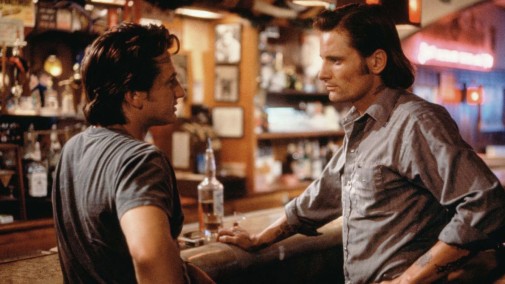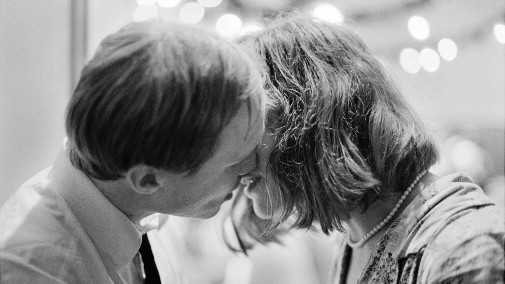After the virulently negative reviews that befell The Last Face, it's surprising to see Sean Penn back in the main competition so soon. Flag Day marks Penn's third directorial effort to vie for the Palme d'Or after winning big in Cannes as an actor. The reactions, so far, seem primarily positive, and that's a big step-up from last time. Another main competition screening was Finnish director Juho Kuosmanen's Compartment No. 6, which some have already compared to Before Sunrise. Back in 2016, he won the Un Certain Regard section with The Happiest Day in the Life of Olli Mäki, so this promotion to the big league feels especially earned. To celebrate the occasion, our alternative program shall focus on these directors' earlier successes…

THE INDIAN RUNNER (1991)
Like him or not, one has to admire how open Sean Penn is about his inspirations. The Indian Runner, this Oscar-winning actor's directorial debut, ends with multiple dedications, and, among them, we find the names of Hal Ashby and John Cassavetes. Yet, even without such loving credit, it's easy to spot what American filmmakers are touchstones to Penn's conception of cinema. From how he frames his actors to the loose rhythms of storytelling, the abstract cycles of structure, it's all very reminiscent of New Hollywood. While a bit unoriginal, that's not necessarily a bad strategy.
Extrapolating a study on brotherly contrasts from Bruce Springsteen's "Highway Patrolman," Penn sets the scene in late 60s Nebraska, when the scars of the Vietnam War were still so fresh they bled. The conflict between David Morse's Joe and Viggo Mortensen's Frank is almost biblical in execution. Tied together by nothing but genetic bonds, these brothers are still drawn to each other's lives, sometimes to destructive effect. So when violence erupts, and one man proves himself essentially unreliable, there's a pitiful sorrow emanating from the screen. Nevertheless, the sense of inevitability is hard to shake. Somehow, it was always meant to be this way.
While overegged, every sequence that appeals to childhood memory, including a last goodbye, impresses through its emotional clarity. The performances help too, though not all of them are equal in quality. Indulging in quirk, Patricia Arquette brings needed levity to this most self-pitying of dramas and is the clear MVP. Her take on Frank's ditsy girlfriend is akin to an overripe fruit, sweet and soft but likely to bruise if handled without care. In limited roles as the brothers' parents, Sandy Dennis and Charles Bronson also leave lasting impressions, hinting at complicated lives beyond the story's frame. All in all, while far from perfect, The Indian Runner remains Sean Penn's best directorial effort. Maybe Flag Day will overthrow it.
Available to rent on Vudu, Redbox, and AMC On Demand.

THE HAPPIEST DAY IN THE LIFE OF OLLI MÄKI (2016)
Pardon the geekery, but before one discusses anything else about The Happiest Day in the Life of Olli Mäki, the matter of filmstock must be addressed. When looking for locations and shooting a couple of early tests, director Juho Kuosmanen soon realized he had a big problem. As is the fate of many a low-budget production that sets its tale in the past, there just wasn't enough money to hide all the modernity in plain sight. The solution was not to alter what was in front of the camera but what was in it. The decision to make the film in silvery monochrome was pretty obvious, but Kuosmanen went further, deciding to work with black-and-white reversal stock.
In these days when digital filmmaking is the norm, The Happiest Day in the Life of Olli Mäki looks exceedingly weird, almost as a period image brought to life. Not even an old movie, but a still photograph in movement. The texture is much less grainy than the standard 16mm, and the way light is captured has a distinct feel. The sun looks brighter, delicate rather than glaring, and dark shadows have a sensuous clarity to their blackness. In summation, the picture looks glorious and immersive, both realistic and romantic, as if emotion were burned into celluloid. It beckons the viewers to lose themselves in the moving images.
Beyond the visual wizardry of Kuosmanen and DP Jani-Petteri Passi, the film's not too shabby either. Portraying the genuine tale of a Finnish boxer who, in 1962, was about to fight in a potential life-changing match, the narrative is both a love story and a study on someone trying to deal with the anxiety brought upon by great expectations. Despite its details, this is in no shape or form a traditional sports movie. Because of such idiosyncrasies, there's a disarming simplicity to the screenplay, a repudiation of forced drama. These choices result in a curious tone of baffled wonderment that only benefits the film in the long run. Overwhelmed by passion, physical exhaustion, mounting pressure, and a desire for uncomplicated happiness, Olli Mäki is the relatable hero of a bittersweet life-affirming comedy.
Streaming on MUBI. You can also rent it on Amazon Video.
What's your opinion on Sean Penn's work behind the camera? What about Kuosmanen?